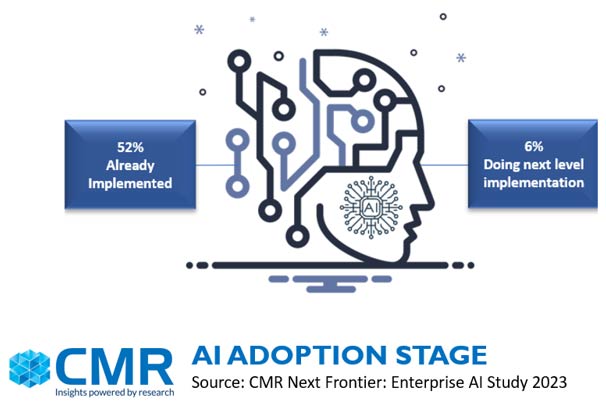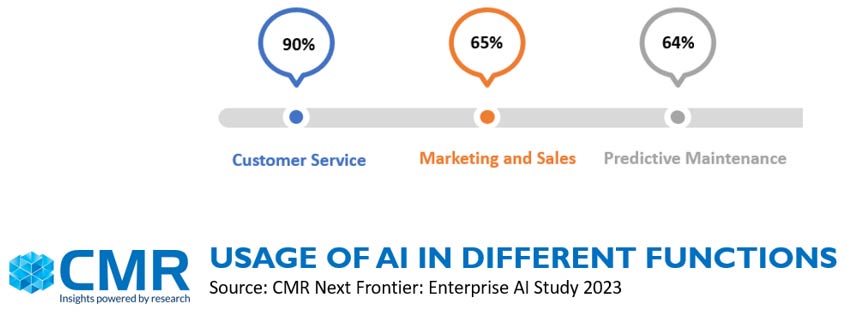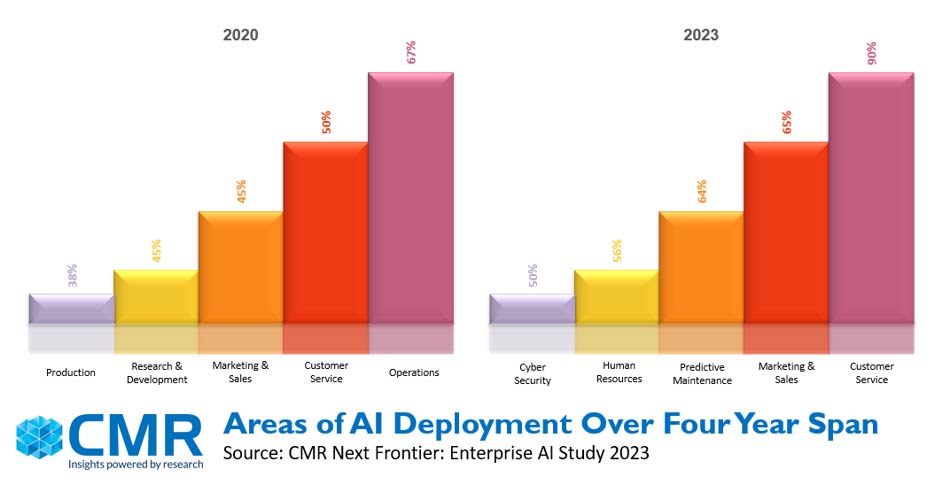The business landscape is undergoing a dynamic shift, marked by the pervasive influence of artificial intelligence (AI), which is increasingly being embraced across various sectors. The integration of AI technologies is not simply a trend but a paradigm shift in business operations. This is reflected in the substantial adoption rate, with 52% of enterprises already leveraging AI to enhance their functionalities.

Enterprises are prioritizing AI adoption to streamline operations and elevate customer experiences. Our recent study at CMR found a significant trend: 90% of AI deployments across diverse sectors (IT, healthcare, retail) focus on customer service, highlighting its growing importance.

India’s AI journey in enterprises is noteworthy. Initially implemented for internal optimization (2020), AI has evolved into a strategic tool for exceptional customer service (2023). This shift reflects a crucial commitment to personalized and efficient interactions, demonstrably leading to enhanced customer satisfaction.

Current challenges of AI in customer service: Below challenges necessitate a measured approach to AI implementation in customer service. A thorough cost-benefit analysis, robust data quality measures, and a focus on human-AI collaboration are essential for maximizing the benefits of AI while mitigating its limitations.
- High Investment and Long Deployment: The financial cost of implementing AI is substantial. Specialized infrastructure, software, and ongoing training for models are required. Furthermore, customization to an enterprise’s specific needs can be a lengthy process, taking months or even years.
- Data Quality and Bias Risk: The effectiveness of AI hinges on the quality of data used for training. Inaccurate or biased data sets can lead to AI systems that perpetuate discrimination or misunderstand customer inquiries. Ensuring clean and representative customer data is crucial for success.
- Limited Capacity for Complexities: While adept at handling routine tasks and answering basic questions, AI struggles with intricate customer issues requiring empathy and nuance. Understanding the full context of a situation or navigating interactions with frustrated customers may be beyond current AI capabilities.
- Customer Privacy Concerns: Growing customer wariness regarding data usage presents a challenge. AI systems that rely heavily on customer data raise privacy issues. Enterprises must prioritize transparency in how they collect and utilize customer information.
- The Human Element Remains Vital: AI’s ability to automate tasks and enhance efficiency is undeniable. However, human interaction remains irreplaceable in customer service. Customers may still prefer live representatives, especially for sensitive matters.
Data-Driven Customer Engagement: Customer service is the linchpin of successful businesses. AI technologies, powered by advanced algorithms and machine learning, are transforming customer engagement. Intelligent chatbots, predictive analytics, and automated support systems empower organizations to offer:
- 24/7 Assistance: Providing continuous support is crucial in today’s global marketplace.
- Swift Query Resolution: Faster resolution times enhance customer satisfaction.
- Anticipatory Customer Needs: Predictive analytics enable proactive intervention, addressing issues before they arise.

Meeting Evolving Customer Expectations: The ever-increasing demands of today’s consumers necessitate seamless, personalized experiences across all touchpoints (online, mobile, in-store). AI empowers enterprises to meet these demands by:
- Real-Time Data Analysis: Extracting valuable insights from vast amounts of data allows for a more data-driven approach.
- Tailored Interactions: Personalization fosters stronger customer relationships.
Operational Efficiency and Cost Savings: AI-driven customer service goes beyond exceptional experiences. It unlocks operational efficiency and cost savings. Automating routine tasks like answering common questions or processing transactions frees up human resources for complex issues requiring human expertise. This leads to:
- Faster Response Times: Improved efficiency translates to quicker resolutions.
- Optimized Resource Allocation: Human capital can be directed towards higher-value tasks.
- Fostering Innovation and Agility: AI deployment fosters innovation and agility within organizations. By continuously analysing customer feedback and market trends, enterprises can adapt their strategies in real-time. This agility is critical in today’s fast-paced business environment, where adaptability is key to success.
AI use cases in Customer Service
- Automated Interaction & Resolution: This category encompasses chatbots, voice analysis (for phone inquiries), and self-service resources (FAQs & knowledge base articles). These AI applications automate initial interactions, address routine inquiries, and empower customers to find solutions independently, improving efficiency and reducing support workload.
- Intelligent Routing & Prioritization: AI facilitates intelligent request routing by analysing the nature and urgency of customer inquiries. This ensures inquiries are directed to the most suitable representatives, optimizing response times and resource allocation.
- Personalized Customer Engagement: Sentiment analysis and data management tools empower businesses to understand customer emotions, personalize responses, and leverage customer data for proactive service. This fosters stronger customer relationships and satisfaction.
- Omnichannel Experience Management: AI supports seamless customer experiences across various touchpoints (online, mobile, in-store). By directing customers to the most appropriate support channels based on context and availability, AI ensures consistent and efficient service delivery.
- Accessibility & Inclusivity: AI-powered multilingual support allows businesses to cater to diverse customer demographics, overcoming language barriers and promoting inclusivity.
- Predictive & Proactive Customer Service: Machine learning and predictive analytics enable businesses to anticipate customer needs, identify trends, and optimize communication strategies. This proactive approach enhances customer satisfaction and fosters loyalty.
Ethical Considerations for Enterprise AI in Customer Service
- Transparency and Explainability: A lack of transparency in AI decision-making processes can erode customer trust. “Black box” AI algorithms, where the reasoning behind decisions is unclear, can lead to frustration and dissatisfaction. To address this, enterprises should strive for explainable AI that allows customers to understand how AI interacts with them and potentially provides justifications for recommendations or actions.
- Fairness and Bias Mitigation: AI models trained on biased data sets pose a significant risk of discrimination against certain customer demographics. Regular audits for bias within AI models are crucial, alongside implementing measures that ensure fair and equitable treatment for all customers.
- Privacy and Data Security Imperatives: Customer data is the foundation of AI-powered customer service. Robust data security practices are paramount to safeguarding sensitive information and ensuring compliance with data privacy regulations. Enterprises must be transparent about customer data usage, providing clear opt-in and opt-out mechanisms for data collection.
- Human Oversight and Defined Accountability: While AI automates tasks, human oversight remains essential. Clearly defined lines of accountability for AI decisions are necessary to guarantee responsible use and facilitate addressing potential issues that may arise.
- Job Displacement and Workforce Upskilling Strategies: The growing use of AI in customer service necessitates proactive approaches to mitigate job displacement concerns for human agents. Responsible AI implementation strategies should prioritize upskilling current employees to effectively collaborate with AI assistants, fostering a human-AI partnership rather than complete workforce replacement.
By addressing these ethical considerations, enterprises can leverage AI in customer service responsibly, building trust with customers while maximizing the technology’s potential for positive impact.
Future Focus: AI-Driven Customer Service as the Cornerstone of Success
The accelerating pace of AI development will paint a transformative picture for customer service. Enterprises that strategically embrace AI will stand poised to achieve unprecedented levels of customer service excellence. AI’s ability to personalize interactions, optimize efficiency, and create seamless experiences will redefine customer expectations. The demonstrably positive impact on customer satisfaction, loyalty, and ultimately, business growth will be undeniable. Looking ahead, relentless investment in AI-powered customer service solutions is not merely a future trend, but an essential pillar for organizational success in the dynamic digital age. As AI capabilities mature, the customer service landscape will undoubtedly be revolutionized, with those who harness its potential reaping the rewards of a loyal and thriving customer base.






